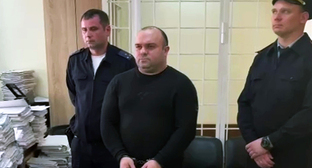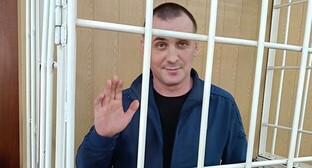08 April 2003, 03:35
Baratashvili, Nikoloz Melitonovich
Georgian romanticist poet. Georgian literature classic.
Born December 15 (27), 1817, in Tiflis, in a noble family. After graduating from Tiflis Noble College in 1835, where he developed humanist and national freedom ideas, the poet was forced to start working as a Court department clerk, which he perceived as a humiliation. In early 1840s, Baratashvili enjoyed the fame of a poet; his poems were first published only in 1852 though, in Tsiskari magazine. In 1844, after his father went bankrupt, Baratashvili transferred to serve in Nakhichevan, then to Gandju, Azerbaijan, where he contracted pyrexia and died on October 9 (21), 1845, at the age of 27. In 1893, Baratashvili's ashes were transported to his motherland and buried in Tbilisi, in the Didubi pantheon of Georgian writers and in 1938 were transported to the pantheon in Mtatsminda mountain.
Nikoloz Baratashvili's poetry is the summit of Georgian romanticism. He only left about 40 poems and an epic. As an art genius, Baratashvili was able to portray a complex inner world of a human and give answers to the sharpest questions of his time. Taking Georgia's loss of independence close to his heart, Baratashvili was disappointed in the society modern to him. The feeling of loneliness filling his early poems (Twilight over the Mtatsminda, 1836, and Reflections on the Kura's Banks, 1837) reaches a tragic climax in the poem Lonely Soul, 1839. However, the tragic conflict with the reality is combined with a deep trust in the triumph of intellect and justice. This foreseeing gift of a poet is brightly incorporated in a masterpiece of Baratashvili's philosophic lyrics, Merani, 1842. The lyric character of the poem, a wing-horseman, is careering into the unknown saying, "I am weak, but I am not a slave to my destiny." This is a dash of a rebellious, freedom-loving, ready for self-sacrifice personality, an anthem to free and powerful spirit of a Man. The symbolism of Merani is multi-dimensional. The character's confidence in his destination and his aspiration to pave a road to happiness for the future generations are a bright expression of the Georgian people's will for national and social liberation. Reflections of the eternal issues of life and the finest movements of a soul are expressed in artistically impeccable poems of Mysterious Voice, My Prayer, I Have Found a Temple in the Sands in the Darkness?, Evil Spirit, Color of the Sky, Blue Color?, and others. The epic Destiny of Georgia (1839) takes a special place among Baratashvili's legacy; it portrays the incursions of Iranian shah Aga-Mohammed-Khan's hordes onto Tbilisi in 1795. In the epic, Baratashvili realistically evaluates the czar Irakly the Second's decision to join Georgia to Russia as historically necessary and progressive. Nikoloz Baratashvili renovated the poetics of a Georgian verse and created samples of reflective poems featuring philosophic depth and simultaneously charming plasticity, musicality, and expressivity. B.L. Pasternak, who translated Baratashvili's poems into Russian, wrote, ."?Genius penetrating Baratashvili's poems, furnishes them the ultimate perfection?". Nikoloz Baratashvili's work, second major Georgia's poet after Shota Rustaveli, inspired many generations of Georgian writers.





Комментирование через Кавказский узел